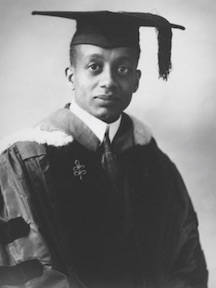By Braden Turner
Alain LeRoy Locke (ΦBK, Harvard, 1908) inspired generations of African Americans as the Father of the Harlem Renaissance. A distinguished theorist, critic, and champion of African-American writers and artists, he also was a notable a philosopher, leading the department at Howard University for several decades. He mentored such giants of African-American culture as Ossie Davis, Langston Hughes, and Zora Neale Hurston, among others. Martin Luther King, Jr. once declared, “We’re going to let our children know that the only philosophers that lived were not Plato and Aristotle, but W. E. B. Du Bois and Alain Locke came through the universe.”
Locke was born in Philadelphia, Pennsylvania, on September 13, 1885. After his father’s death in 1891, he was raised solely by his mother, a teacher. He proved to be a gifted child and, in 1907, graduated from Harvard with degrees in English and philosophy. He won Harvard’s prestigious Bowdoin Prize for an English essay and earned membership in Phi Beta Kappa. The same year, Locke became the first African American to win a Rhodes Scholarship.
While Locke’s academic merit was clearly evident, he nevertheless encountered difficulties because of his race. Several colleges at Oxford rejected him despite his Rhodes Scholarship, and some fellow American Rhodes Scholars refused to study in the same institution as him. Hertford College at Oxford ultimately allowed him admittance, where he studied from 1907 to 1910. Locke would be the only African-American Rhodes Scholar until 1963.
After his time at Oxford, Locke spent an additional year studying philosophy at the University of Berlin before returning to the United States. In late 1911, he toured the American south with Booker T. Washington to observe the quality of African-American education in the region. He accepted an assistant professorship at Howard University in 1912, and then returned to Harvard, earning his Ph.D. in philosophy in 1918.
After obtaining his Ph.D., Locke became the department chair in philosophy at Howard University. Unfortunately, his race once again put him at odds with the academic establishment of his time. Locke’s initiatives for pay equity between black and white faculty and for greater focus on African-American studies resulted in his dismissal from Howard in 1925. Ironically, the year of his firing doubled as the year of his best known work, The New Negro: An Interpretation.
The New Negro anthologized the achievements of the Harlem Renaissance, featuring music and poetry by Langston Hughes, short fiction by Zora Neale Hurston, and essays by W. E. B. Du Bois and Walter Francis White. Locke edited the collection and contributed five essays himself. The text became an instant classic. The New Negro and additional essays by Locke solidified his place in history as the “Father” or “Dean” of the Harlem Renaissance.
It’s important to note, however, that Locke contributed much more than The New Negro alone. His 1935 essay on value theory, “Values and Imperatives,” is described by the Stanford Encyclopedia of Philosophy as a “seminal” work. Locke continued to influence the African-American literary world by contributing reviews to journals such as Opportunity: A Journal of Negro Life and Phylon. The complete list of his publications and achievements seems nearly endless, but other major projects include When Peoples Meet: A Study of Race and Culture Contacts, with Bernhard J. Stern (1946) and Harlem: Mecca of the New Negro (1925).
In 1928, he was reinstated at Howard University after petitioning the school’s first African-American president, Mordecai W. Johnson. There he remained and worked until his retirement in 1953. He died a year later. Today, the College of Arts and Sciences building at Howard bears his name, Locke Hall—a stunning and just reversal from his dismissal in 1925.
In 2014, fellow African-American Rhodes Scholars raised $8,000 to have Locke’s remains permanently interred at the Congressional Cemetery. The stone on the plot reads, “Teneo te, Africa.” Translated, “I hold you, my Africa.” Locke’s grave and life are reported to be part of a tour of the Congressional Cemetery. Alain Locke may not be a household name, but thanks to these efforts and the enduring legacy of his work, he’ll never be forgotten.
Braden Turner is a senior at The University of Tulsa majoring in English and minoring in history and economics. He became a member of Phi Beta Kappa in 2017, during his junior year. The University of Tulsa is home to the Beta of Oklahoma Chapter of Phi Beta Kappa.
Photo: Locke upoon earning his Ph.D. at Harvard in 1918.




